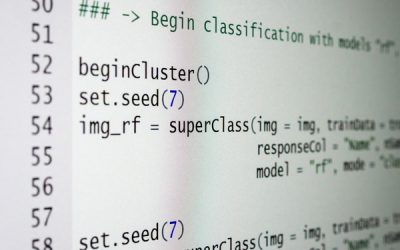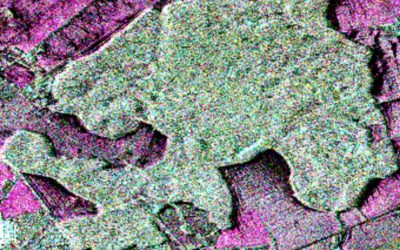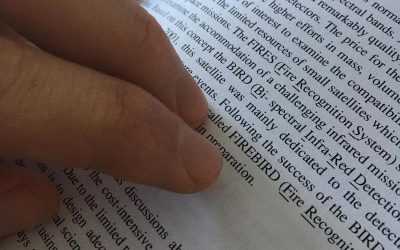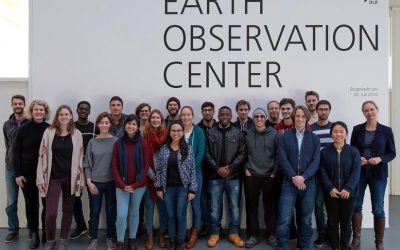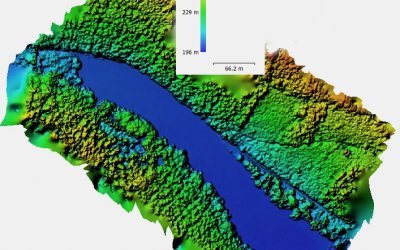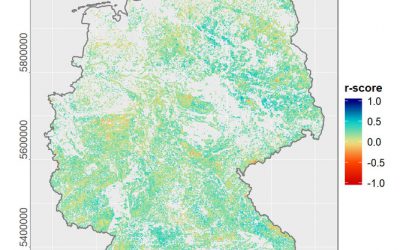Aim
In this module you will gain a detailed understanding of the advantages and challenges of Earth observation using Light Detection and Ranging (LiDAR) systems. Compared to other types of remote sensing data, the data from active Light Detection and Ranging (LiDAR) systems is of particular importance for local studies, where the 3D component (height) of objects is of relevance. Commonly LiDAR data is applied it in the field of digital terrain modelling, in forestry – e.g. for canopy height assessment, or urban structure applications. LiDAR embraces a range of active remote sensing systems mounted on different platforms, which provide valuable information for characterization of horizontal and vertical structure of the earth surface by measuring the travel time of laser pulses in visible and near-infrared spectral domains. The quality of scanning depends on the nature of the LIDAR system (discrete-return or full waveform) as well as on a set of other terrain- and data-driven factors. This course provides you with an overview on the theory and applications of LiDAR data, with a particular focus on airborne laser scanning. Following the initial theoretical sections on the principles and basic characteristics of LiDAR data, diverse practical steps and exercises will be implemented to provide real-world examples to illustrate how the LiDAR point clouds can be applied to extract information on terrain, surface and vegetation. These information will be further employed to model vegetation structural attributes on multiple spatial scales ranging from single trees to landscape levels.
Content
Block 1: Introduction to LiDAR (how does laser scanning work?)
- Reminder on general remote sensing issues: difference between active and passive sensing
- History of LiDAR measurements
- Basics of LiDAR data measurements (platforms, sensors)
- Airborne vs. spaceborne LiDAR: history, applications and data access
- Measurement of travel time of laser light (pulsed time of flight)
- On the concept of “structure”: why a third dimension is crucial?
Block 2: Principles of LiDAR measurements
- Platform navigation, orientation and positioning
- Difference between types of data acquisitions: discrete return and echo waveform
- The recorded parameters: elevation, height, signal intensity and co.
- The concept of „single-pulse“ vs. „multiple-pulse“
- How are the incoming returns recorded? first come- first served!
- Terrestrial LiDAR measurement: one position, rotating scanner
- Data formats and big data-management: each byte matters!
Block 3: Elevation models:
- General thoughts: why are the elevation models essential?
- Digital terrain models
- Digital surface models
- Normalized DSM (Canopy height models)
- Application fields: Forest, landscape and habitat representations
- Magnified focus on Forest (basic and derived parameters): Diameter at breast height, height, tree type proportions, tree type mapping, crown closure, stem count, growing stock und aboveground biomass
- Single tree measurements
- Urban: City models, roof top and building footprints
Block 4: Exercises in Open-Source domain of LiDAR data processing (Fusion/LDV, LASTools, R)
- Exercises on point cloud processing
- Import, export, visualizations and rendering
- Sample measurements, single tree measurements and associated tasks
- Elevation models
- Data trimming, cropping, smoothing and generalizing
- Catalog and descriptive communication
- Extraction of metrics for modeling purposes
- Thoughts on metrics
- Intensity: yes or no?
- Multi-scale metric extraction
- Multi-source metric extraction
- Class works and workshops (CIP-Pool/Homework)
- Literature review, discussion groups and public presentations
Coding
Coding examples and individual work will be covered
Software
Various software programs will be used, but mainly OpenSource software such as R.
Techniques
Different techniques will be introduced and practically applied.
Content
The content of scientific with regard to the audience will be discussed.
General Course News and Updates
Internship and MSc idea presentations
On Friday 10th of January the following presentations will take place in OKW86, room 1.009 from 10am onwards. Ojo Segun Adewale:Internship: Prediction of Gross Domestic Product using Remote Sensing Data (A case study of Brazil). Thesis Idea: Application of Remote...
M.Sc. Idea presentation by Nina Gnann and internship by Basil Tufail and Malin Fischer
Nina, Malin and Basil will present their M.Sc. idea and internships on Friday 20th of December in room 1.009 OKW 86. Ninas' envisioned M.Sc. is "Plastic waste detection assisted by artificial intelligence". Basil internship is titled: "Global training dataset for...
M.Sc. idea presentation by Felix Glasmann
Felix Glasmann is presenting on Friday, 13th of December at 10am in room 1.009 OKW 86, his M.Sc. idea "Potential of the Firebird Mission for the Detection of Gas-flaring Activity". In times of worldwide phenomena like ‘Fridays for Future’ or ‘Extinction Rebellion’ it...
EAGLEs at DLR EOC
Our 2019 EAGLEs visited the DLR-EOC and learned a lot about current earth observation research at DLR. Many talks as well as discussions with PhD, Postdocs and teamleaders were organized by Prof. Claudia Kuenzer, head of the landsurface department and professor in...
Short Presentation on UAV and LiDAR
This Friday at 12am we will have two brief presentations by colleagues from the Max-Planck-Insitute and University Göttingen in room 1.009 OKW 86, right after the student presentations: Dr. Anne Scharf (MPI-AB) "The need for a closer look: how drones could fill in the...
M.Sc. defense by Marius Philipp on Nov. 22nd
Marius Philipp is going to defend his M.Sc. thesis on November 22nd at 10 am in room 1.009 (OKW86). The title of his thesis is "Potential of harmonic analysis using remote sensing data for studying the effects of climate change induced weather extreme events on forest...
MSc idea and internship presentations
On Friday, 8th of November, from 10-12am the following presentation will take place in room 01.009, OKW 86: Michael Wang:"Deriving Surface Heat Island Intensities for TraK and CURE" - internship and thesis idea presentation Patrick Sogno:"The Hitchhikers Guide to an...
M.Sc. idea presentations and internship presentation
On Friday 25th of October several EAGLEs will present their M.Sc. thesis ideas and report back from an internship experience. It will take place at 10am in room 1.009, OKW 86. Katrin Hasenbein (MSc idea): "The potential of time-series data to improve fine scale...
M.Sc. idea presentation by Salim Soltani
Salim Soltani will present his M.Sc. idea ""Spatio-Temporal Analysis of Urbanization caused by the Belt-and-Road Initiative" on October 23rd at 10:30 in 1.009 OKW 86.
Welcome of the 2019 EAGLEs
On Monday, 14th of October, at 4 p.m., we will again welcome a new generation of EAGLEs (Z6, 01.002). After the official welcome and some introductory presentations, we will also introduce the lecturer and provide first details about the upcoming semester(s)....

